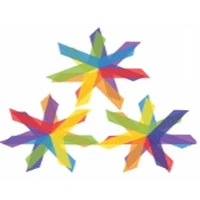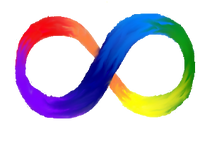MissLunaRose (talk | contribs) (Adding categories) Tag: categoryselect |
Lady Lostris (talk | contribs) m (Reverted edits by MichaelCooper70 (talk) to last revision by TLPG) Tag: Rollback |
||
| (7 intermediate revisions by 5 users not shown) | |||
| Line 1: | Line 1: | ||
[[File:Autism Acceptance Month Logo.jpg|thumb|200x200px|The use of the rainbow in the Autism Acceptance Month logo is reminiscent of the neurodiversity symbol.]] |
[[File:Autism Acceptance Month Logo.jpg|thumb|200x200px|The use of the rainbow in the Autism Acceptance Month logo is reminiscent of the neurodiversity symbol.]] |
||
| − | '''Autism Acceptance Month''' is an event that takes place during April. It has been championed by |
+ | '''Autism Acceptance Month''' is an event that takes place during April. It has been championed by Autistic people, their loved ones, and their allies as an alternative to Autism awareness. |
== History == |
== History == |
||
| − | Autism Acceptance Month was first organized by Paula Durbin Westby in 2011. The emphasis on acceptance was a response to Autism Awareness |
+ | Autism Acceptance Month was first organized by Paula Durbin Westby in 2011. The emphasis on acceptance was a response to Autism Awareness Day, an event run by Autism Speaks, an organization known among the Autistic community for its demonization of autism and its attempts to silence Autistic people's protests. |
| − | Autistic writers have discussed their frustrations with |
+ | Autistic writers have discussed their frustrations with Autism awareness:<blockquote>"In the past, Autism awareness efforts have at best promoted this kind of false tolerance and at worst have promoted outright lies that we are pathetic, helpless, unfeeling people or at worst tragic mistakes of nature or genetics. So, what good is awareness when it consists of fallacies, half-truths, and dangerous stereotypes? This is why the focus must shift from awareness to acceptance."</blockquote><blockquote>—Nicole Nicholson and Virgil S. Maday<ref>[http://www.autismacceptancemonth.com/activism-through-art-what-autism-acceptance-means-to-us/ What Autism Acceptance Means to Us]</ref></blockquote>Autism Acceptance Month is heavily supported by [[Autistic Self Advocacy Network|ASAN]], which has set up a website dedicated to the month. It is celebrated by autistic people, their loved ones, and their allies all around the world. |
== Principles == |
== Principles == |
||
| Line 12: | Line 12: | ||
=== Neurodiversity === |
=== Neurodiversity === |
||
| − | [[Neurodiversity]] is the idea that autistic people add diversity to the world, and that disability is part of the human experience. Neurodiversity advocates oppose the idea of an |
+ | [[Neurodiversity]] is the idea that autistic people add diversity to the world, and that disability is part of the human experience. Neurodiversity advocates oppose the idea of an Autism "cure," and want to focus more on helpful and respectful therapies. They believe that Autistic people should be accepted in society. |
=== Nothing About Us Without Us === |
=== Nothing About Us Without Us === |
||
| − | The disability rights movement holds that disabled people ought to be included in general conversations that are about them. (This has not been the case with Autism Awareness |
+ | The disability rights movement holds that disabled people ought to be included in general conversations that are about them. (This has not been the case with Autism Awareness Day, where protests from the Autistic community are ignored.) |
| − | Autism Acceptance Month was started for and by |
+ | Autism Acceptance Month was started for and by Autistic people. [[Neurotypical|Non-autistic]] loved ones and allies celebrate the month at their sides. |
=== Changing Public Perceptions === |
=== Changing Public Perceptions === |
||
| − | Acceptance means not only understanding |
+ | Acceptance means not only understanding Autism, but respecting Autistic people and not [[ABA|trying to change]] fundamental aspects of who they are. |
| − | Acceptance includes education and inclusion. Non- |
+ | Acceptance includes education and inclusion. Non-Autistic people are encouraged to learn about [[Autism]] and accept differences in the people around them. |
== Self Esteem == |
== Self Esteem == |
||
| − | One reason why autistic people care so deeply about |
+ | One reason why autistic people care so deeply about Autism acceptance is in the hopes of improving self esteem. Theories such as the social model of disability can help disabled people develop self esteem.<ref>[http://www.xojane.com/issues/i-am-not-a-person-with-a-disability-i-am-a-disabled-person Lisa Egan: I'm Not A "Person With a Disability": I'm a Disabled Person]</ref> |
Daniel Obejas notes that the awareness paradigm is one of<blockquote>"burden and tragedy. We need to keep bombarding you with these messages until you’re adequately scared of this horrible affliction! Even my friends and family can think of me as less of a person because of an identity that constitutes the entirety of my being. It is not difficult to imagine how that would be harmful to someone’s relationships, opportunities, and self-esteem."<ref>[http://www.autismacceptancemonth.com/autism-in-our-own-words/ Autism Acceptance Month: Autism In Our Own Words - Awareness Has Done Its Damage]</ref></blockquote>Autism Acceptance Month contains a series of images entitled "Autism acceptance is liking who you are!"<ref>[http://www.autismacceptancemonth.com/autism-acceptance-is-liking-who-you-are/ Autism Acceptance Month: Autism acceptance is liking who you are!]</ref> |
Daniel Obejas notes that the awareness paradigm is one of<blockquote>"burden and tragedy. We need to keep bombarding you with these messages until you’re adequately scared of this horrible affliction! Even my friends and family can think of me as less of a person because of an identity that constitutes the entirety of my being. It is not difficult to imagine how that would be harmful to someone’s relationships, opportunities, and self-esteem."<ref>[http://www.autismacceptancemonth.com/autism-in-our-own-words/ Autism Acceptance Month: Autism In Our Own Words - Awareness Has Done Its Damage]</ref></blockquote>Autism Acceptance Month contains a series of images entitled "Autism acceptance is liking who you are!"<ref>[http://www.autismacceptancemonth.com/autism-acceptance-is-liking-who-you-are/ Autism Acceptance Month: Autism acceptance is liking who you are!]</ref> |
||
| − | Acceptance offers |
+ | Acceptance offers Autistic people a relief from the focus upon deficits and trying to be indistinguishable from their peers.<ref>[http://www.autismacceptancemonth.com/awareness-vs-acceptance-do-words-matter/ Autism Acceptance Month: Awareness vs Acceptance - Do Words Matter?]</ref><ref>[http://www.autismacceptancemonth.com/why-we-need-autism-acceptance/ Paula Durbin-Westby: Why We Need Autism Acceptance]</ref> It allows them to be themselves on their own terms, not on terms pushed onto them.<ref>[http://www.autismacceptancemonth.com/be-the-very-best-you-you-can-be/ Ariane Zurcher: Be the Very Best YOU, You Can Be!]</ref> (This does not mean not wanting to help them, simply encouraging their self esteem while helping them reach their goals.)<ref>[http://www.autismacceptancemonth.com/autism-acceptance-a-parental-perspective/ Autism Acceptance: A Parental Perspective]</ref> |
| − | Acceptance can be a huge relief for |
+ | Acceptance can be a huge relief for Autistic people. |
== Resources == |
== Resources == |
||
| Line 42: | Line 42: | ||
== References == |
== References == |
||
| − | <references /> |
+ | {{small|<references />}} |
| + | [[Category:Acceptance]] |
||
[[Category:Community]] |
[[Category:Community]] |
||
[[Category:Organizations]] |
[[Category:Organizations]] |
||
Revision as of 00:09, 24 March 2021

The use of the rainbow in the Autism Acceptance Month logo is reminiscent of the neurodiversity symbol.
Autism Acceptance Month is an event that takes place during April. It has been championed by Autistic people, their loved ones, and their allies as an alternative to Autism awareness.
History
Autism Acceptance Month was first organized by Paula Durbin Westby in 2011. The emphasis on acceptance was a response to Autism Awareness Day, an event run by Autism Speaks, an organization known among the Autistic community for its demonization of autism and its attempts to silence Autistic people's protests.
Autistic writers have discussed their frustrations with Autism awareness:
"In the past, Autism awareness efforts have at best promoted this kind of false tolerance and at worst have promoted outright lies that we are pathetic, helpless, unfeeling people or at worst tragic mistakes of nature or genetics. So, what good is awareness when it consists of fallacies, half-truths, and dangerous stereotypes? This is why the focus must shift from awareness to acceptance."
—Nicole Nicholson and Virgil S. Maday[1]
Autism Acceptance Month is heavily supported by ASAN, which has set up a website dedicated to the month. It is celebrated by autistic people, their loved ones, and their allies all around the world.
Principles
Autism Acceptance Month is based around several central tenets.

The rainbow infinity sign represents neurodiversity.
Neurodiversity
Neurodiversity is the idea that autistic people add diversity to the world, and that disability is part of the human experience. Neurodiversity advocates oppose the idea of an Autism "cure," and want to focus more on helpful and respectful therapies. They believe that Autistic people should be accepted in society.
Nothing About Us Without Us
The disability rights movement holds that disabled people ought to be included in general conversations that are about them. (This has not been the case with Autism Awareness Day, where protests from the Autistic community are ignored.)
Autism Acceptance Month was started for and by Autistic people. Non-autistic loved ones and allies celebrate the month at their sides.
Changing Public Perceptions
Acceptance means not only understanding Autism, but respecting Autistic people and not trying to change fundamental aspects of who they are.
Acceptance includes education and inclusion. Non-Autistic people are encouraged to learn about Autism and accept differences in the people around them.
Self Esteem
One reason why autistic people care so deeply about Autism acceptance is in the hopes of improving self esteem. Theories such as the social model of disability can help disabled people develop self esteem.[2]
Daniel Obejas notes that the awareness paradigm is one of
"burden and tragedy. We need to keep bombarding you with these messages until you’re adequately scared of this horrible affliction! Even my friends and family can think of me as less of a person because of an identity that constitutes the entirety of my being. It is not difficult to imagine how that would be harmful to someone’s relationships, opportunities, and self-esteem."[3]
Autism Acceptance Month contains a series of images entitled "Autism acceptance is liking who you are!"[4]
Acceptance offers Autistic people a relief from the focus upon deficits and trying to be indistinguishable from their peers.[5][6] It allows them to be themselves on their own terms, not on terms pushed onto them.[7] (This does not mean not wanting to help them, simply encouraging their self esteem while helping them reach their goals.)[8]
Acceptance can be a huge relief for Autistic people.
Resources
The Autism Acceptance Month offers resources for various people who want to learn. These resource pages link to various reputable informational websites and ways to find support.
- Resources for Autistic People
- Parent Resources
- Information for New People
- Educator Resources
- Employer Resources
References
- ↑ What Autism Acceptance Means to Us
- ↑ Lisa Egan: I'm Not A "Person With a Disability": I'm a Disabled Person
- ↑ Autism Acceptance Month: Autism In Our Own Words - Awareness Has Done Its Damage
- ↑ Autism Acceptance Month: Autism acceptance is liking who you are!
- ↑ Autism Acceptance Month: Awareness vs Acceptance - Do Words Matter?
- ↑ Paula Durbin-Westby: Why We Need Autism Acceptance
- ↑ Ariane Zurcher: Be the Very Best YOU, You Can Be!
- ↑ Autism Acceptance: A Parental Perspective
